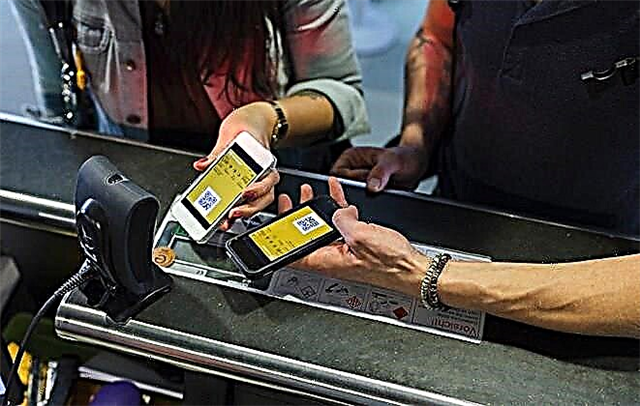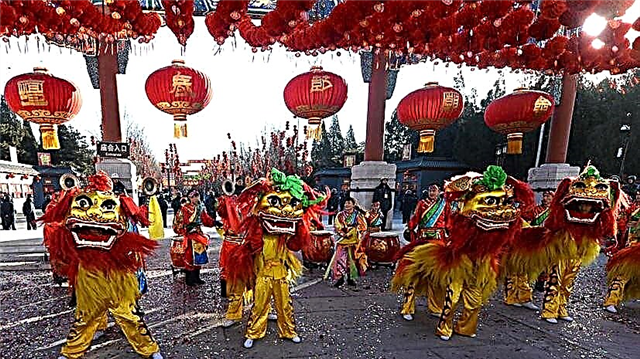Fireworks, firecrackers and petards, festive processions and carnivals - all this can be seen on the streets of Chinese cities in the month of January and February. Stories about how the New Year is celebrated in China excite the minds of Europeans who are not familiar with the history and traditions of the holiday.
History of the holiday
Chinese New Year has been celebrated for over 4000 thousand years... But he does not have an exact date on the calendar. So, if the whole world celebrates a traditional holiday exclusively in winter - January 1, then the Chinese celebrate for 15 whole days, starting from the first day, on which the second new moon falls after the winter solstice.

The first day of the holiday, in fact, New Year's Eve, may fall on a date between January 21 and21 february inclusive. For example, in 2020, the Chinese celebrated the New Year on January 25, and in 2021 it will come only 12th of February.
It is impossible to say with 100% accuracy who first spoke about the holiday. It is shrouded in many myths, legends and traditions that are sacredly revered even by the modern Chinese who have dispersed around the world.

According to one version (recorded in Shangshu - a book telling about the history of China and allegedly edited by Confucius himself) Shun, who lived in the XXIII century BC. ascended the throne on the second new moon. Yu followed suit. And so a tradition arose that became a holiday.
Important! The celebration received its official name after 1911 (approved in 1949). The Chinese began to call it the Spring Festival or Chunjie.
Night withDecember 31 to January 1 called "Yuan-dan" or "the beginning of dawn". The distinctions were introduced due to the use of the Gregorian calendar everywhere, which does not coincide with the lunar dates.
The Chinese New Year is known for an unprecedented duration for this country (2 weeks) and the fact that not a single inhabitant of the country shies away from celebrating it. This is the most important and important holiday, the only opportunity for the family to get together.
Holiday mythology
The Chinese are great followers of traditions and myths. According to legend, Chunjie should be celebrated as the day of liberation from a sea monster, an inhabitant of the deep sea and a great lover to feast on animals, children and supplies. This monster was called Chun or Nian.
It was so terrible and dangerous that people did not even think about fighting. Frightened inhabitants of cities and villages piled all kinds of food at the doors of their houses, in the hope that the beast would get enough of them and would not touch the family.
You May Also Like
One day, when Nian was walking through the village, a little boy ran out to meet him. The relatives had already said goodbye to the child, but the animal passed by, not noticing the prey.

The real reason for such actions was soon found out. The boy was wearing a red shirt. As soon as people realized that the monster was afraid, they began to decorate courtyards with red paper lanterns, put on shirts and pants made of red fabric, and hang the walls of houses with red scrolls. The frightened Nian left this world forever.
Official holiday dates
Regardless of the day of the holiday, employers provide their employees with a day off, and sometimes vacation, lasting 2 weeks. The inhabitants of the Celestial Empire use this time to:
- get home from different parts of the world;
- meet family and friends;
- take part in dozens of entertainment events, carnivals, theatrical performances;
- launch several fireworks, firecrackers and firecrackers into the sky.
In the west, for example, in the USA, where many Chinese live,

The New Year is not an official holiday, but employers are well aware that these days they will receive more requests for leave, time off, and extraordinary days off than usual. The country's airports are overcrowded with Chinese who want to fly home.
Chinese New Year: how to prepare
Preparing for the New Year in China includes:
- General cleaning of the premises. The house is cleaned from the doorstep to the most inaccessible corners. Not a single speck of dust should remain. Cleaning tools are removed from conspicuous places. Guests cannot see scoops, brooms, cleaning products. Cleaning is mandatory, since there is a belief that the patronizing deity of the family on New Year's Eve bestows good luck on the family. It settles in the dwelling in the form of dust. Thanks to cleaning, people quickly realize how much happiness and good luck the Gods have sent them.
- Refusal of all unnecessary and old things. Such people are simply thrown into a landfill.
- Home decoration. Garlands and lanterns made of red paper are hung on the walls, and the Tree of Light (replacing the New Year tree) with flowers is decorated. In Hubei province, for example, a scroll is hung on the door with the image of the character "Fu", meaning "happiness" or "prosperity." An image of the "Sweet God" is hung in the kitchen. On the eve of the Spring Festival, all the housewives in the Middle Kingdom grease his lips with honey. Going to heaven, this God will tell the rest of the deities only the most pleasant things about the family.
- Preparation of festive dishes. On the table must be meat (pork, beef, duck or chicken), fish, dumplings, rice. Pork sausages are very popular. Dumplings are an integral part of the festive event, while they are prepared by the whole family, independently.
Important! The variety of the festive table is a sign of the family's wealth. If the arrangement of a rich dinner is an unaffordable luxury, they put one bowl with something meat on the table, vegetables and rice are served as a side dish.

You May Also Like
Preparation methods and details may differ depending on the region. Together with China, the celebration is celebrated by Manchuria and Vietnam, Thailand and Laos, and a number of other Asian states.
Chinese New Year: Celebration Traditions
Spring Festival in China is celebrated in the family circle. On this day, you must definitely be with your family. The younger generation with children comes to the house of elderly parents. This tradition has been followed for centuries. It is also accepted in the Celestial Empire:
- buy new clothes and celebrate the New Year in them;
- burn incense;
- give old people and children money in a red envelope;
- wear red underwear if the symbol of the upcoming new year (there are 12 of them, according to the signs of the zodiac) coincides with the symbol of the year in which the person was born;
- scatter oranges around the house (there should be 108), reminiscent of joy, sun and happiness;
- to call 108 times into the bell, freeing a person from sins and protecting him from evil spirits.
Clothes should be bright - red or gold, perhaps pink or green. Interestingly, people over a certain age (30 for women and 32 for men) will not be respected by relatives if they come to a gala dinner alone.

It is interesting! Unmarried Chinese people often order girls or boys through special agencies, who, for a certain fee, introduce themselves to the customer's relatives as his fiancé or fiancée and are ready to celebrate with them. Tourists from Europe cannot understand such a tradition.
Festive events
The family spends the first night of the year together. But the remaining holidays are accepted:
- devote to visiting friends and acquaintances (for 3-4 days);
- jointly prepare dumplings - "jiao tzu", which are eaten for breakfast (5-6 day);
- pray (the morning of the 7th day begins with prayer and the use of fresh fish salad);
- visit temples (on the 8-10th day they go to the temple, where they light candles for a good harvest);
- arrange a holiday in honor of a married man (on the 11th day, the father-in-law invites his son-in-law to a party or dinner);
- prepares for the Lantern Festival (12-14 days);
- launch flashlights into the sky, participate in theatrical performances, concerts and other public events (Day 15).
Important! The inhabitants of the Celestial Empire do not talk about the past. It is not customary to remember the successes or failures that have befallen in the past year. The main thing is the future.

The main attributes of Chunjie are fireworks, petards and lanterns. Loud pops help ward off evil, and bright colors attract good forces. The Chinese love to try on carnival clothes. Festive processions of dragons and lions, monsters of unknown origin, go through the cities and villages.
New Year's Chinese superstitions and omens
The Chinese prefer to talk only about good things on holidays. This is the best time to be forgiven. Refusing to forgive is a bad omen. There are other New Year traditions in China that will be useful to know about:
- 108 beats of the bell. Vices accumulate in a person throughout the year. There are 6 of them in total. People are greedy, stupid, evil, indecisive, frivolous and envious. Each blemish has 18 more shades. The bell helps to get rid of them. Each blow of it is minus one vice, therefore, on the eve of Chunjie, bells and large bells are ringing throughout the country.
- Dance of the lion and dragon. The dancing lion is a symbol of protection from adversity in the coming year. The Chinese New Year dragon is a tribute to these mythical creatures.
- Coin in dumplings. When sculpting homemade dumplings, they put a coin in one of them, whoever gets it, that whole year will be extremely lucky.
The Chinese believe that on the day of the celebration, one should constantly smile, or better, laugh. By doing this, they set themselves up in a positive mood and attract the attention of good forces that bring happiness. Fate is unfavorable to gloomy, constantly grumbling and all dissatisfied people, the ancient spring holiday is not for them.
What do they give in China for the New Year
The Chinese pay less attention to gifts than the Europeans; China's New Year traditions do not involve presenting each other with cards or expensive gifts. They don't spend much time shopping hoping to find the right gift for their mom, dad, girlfriend and her kids. Traditionally they give:
- money in a red envelope;
- food;
- packs of cigarettes;
- alcohol;
- something extremely useful.

Attention! There is an unspoken rule that older people are given a more expensive gift. The older a person is, the more money it is customary to put in the envelope intended for him.
Dos and Don'ts on Chinese New Year
The Chinese are extremely superstitious. So, it is forbidden:
- remember at the table about the past year, bad weather, crop failure;
- wear white or black clothes for the celebration;
- cleaning the house for the first 3 days after the holiday, you can sweep away all the good;
- the first 2 days to buy shoes, in Chinese this word means "heavy" (you can bring trouble);
- during a solemn event, you cannot say the word "four", in translation from Chinese it means "death" (when calculating or listing any facts, the four is omitted);
- use sharp objects, there should be no knife on the table;
- cut hair;
- swear, show aggression;
- greet the holiday lying down.
Before the celebration, it is better to distribute debts.
Chinese New Year is a beautiful, but a little strange holiday. People dress up in red robes, hang lanterns on the doors of houses, and launch fireworks. Family celebration. It is customary to collect all relatives on it. Gifts are usually not given, but traditions are emphasized. When planning to visit during Chunjie, for example, Beijing or Shanghai, you should prepare for the fact that all tickets will be sold out and find out how the New Year is celebrated in China will not work.











